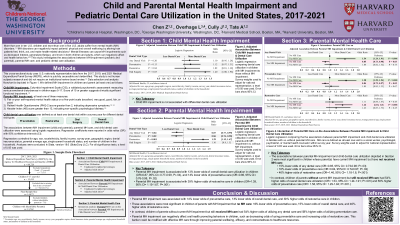Preventive
Associations between Mental Health Impairment and Pediatric Dental Care Utilization
55 - Child and Parental Mental Health Impairment and Pediatric Dental Care Utilization in the United States, 2017-2021


Ziwei Chen, DMD (she/her/hers)
Pediatric Dental Resident, PGY2
Children’s National Medical Center, Washington, D.C.
Bowie, Maryland, United States- LO
Lindsay N. Overhage, BA
Harvard Medical School
- JC
Jennifer L. Cully, DMD
Chief of Dentistry
Children's National Hospital
Washington, District of Columbia, United States .jpg)
Anupama Rao Tate, DMD
Oral Health Advocacy Director, Associate Professor of Pediatrics (George Washington Medical School)
Children’s National Medical Center, Washington, D.C.
The George Washington Univeristy School of Medicine
Washington, District of Columbia, United States- MC
Mudrika Chhabra, DMD
Program Director
Children's National Hospital
Washington DC, District of Columbia, United States
Presenting Author(s)
Co-Author(s)
Research Mentor(s)
Program Director(s)
Purpose: Mental illnesses can cause mental health (MH) impairments such as decreased interest, generalized fatigue, and more in children and adults, which can negatively affect oral health behaviors. This study investigates the associations between MH impairment and pediatric dental care utilization.
Methods: This cross-sectional study uses US nationally representative data from 2017-2021 Medical Expenditure Panel Survey (n=13,762). The associations between MH impairment and dental care utilization were assessed using Pearson's chi-squared test and logistic regressions. Regressions controlled for age, sex, race/ethnicity, family income, year, geographic region, dental insurance, parental age, single-parent-household, and number of children in the household.
Results: Parental MH impairment was associated with lower odds of overall dental care (OR=0.87, 95% CI= 0.77-0.99, P=.04), preventative care (OR=0.86, 95% CI= 0.76-0.98, P=.02), higher odds of restorative care use (OR=1.39, 95% CI= 1.15-1.67, P=.001). These associations were most significant in children with parental MH impairment but no MH care: overall dental care (OR=0.85, 95% CI= 0.73-0.98; P=.03), preventative care (OR=0.83, 95%CI= 0.72-0.96; P=.01), restorative care (OR=1.46, 95% CI= 1.18-1.8, P< .001). Children of parents without current MH impairment but still received MH care had higher odds of overall dental care (OR= 1.54, 95% CI= 1.24-1.91; P < .001) and preventative care (OR= 1.58, 95% CI= 1.29-1.94; P < .001).
Conclusions: Parental MH impairment was associated with 14% lower odds of preventative care, 13% lower odds of overall dental care, 39% higher odds of restorative care in children. These associations were most significant in children with parental MH impairment but no MH care.
Identify Supporting Agency and Grant Number:
Research supported by NIMH T32 MH019733 (LO), NIA T32AG51108 (LO). The content is solely the responsibility of the authors and does not necessarily represent the official views of the National Institute of Mental Health (NIMH), National Institute of Aging (NIA), or the National Institutes of Health (NIH).

.jpg)